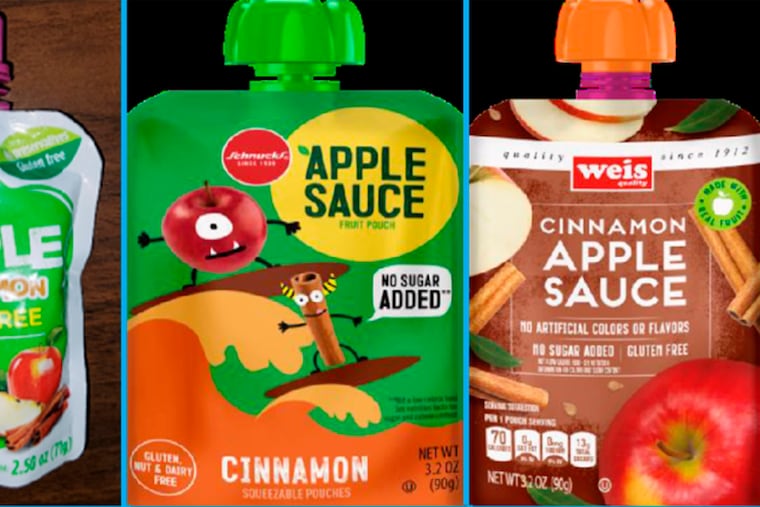Pa. Health Department recorded 22 ‘probable’ cases of lead-tainted applesauce poisoning
Hundreds of American children were poisoned by the applesauce last year, revealing failures in the American food safety system, an investigation by the New York Times and The Examination found.

Hundreds of American children were poisoned by lead-contaminated, cinnamon-flavored applesauce last year, revealing troubling issues within the American food safety system, an investigation by the New York Times and nonprofit newsroom the Examination found.
The Pennsylvania Department of Health said it has reported 23 cases to the Centers for Disease Control and Prevention, including 22 “probable” cases and one “suspect” case. The CDC, which classifies cases as “confirmed, probable, or suspected,” has recorded 468 cases from 44 states, including 111 confirmed cases.
The Pennsylvania cases occurred in Chester, Delaware, Montgomery, and Philadelphia Counties, as well as in seven others, said Health Department spokesperson Neil Ruhland.
The applesauce, sold in pouches under the name WanaBana and generic store brands such as Pennsylvania-based Weis, was recalled last fall. (There are Weis locations around the region, in towns such as Conshohocken, Norristown, and Huntingdon Valley.) The FDA told the public to throw away any such products.
Citing investigations by officials in Ecuador, the FDA said it was likely that a spice grinder there had contaminated the cinnamon with lead.
The FDA recommended people “call your health-care provider about getting a blood test for lead if you or your children may have consumed recalled products.”
The New York Times and the Examination’s investigation, based on hundreds of pages of documents and interviews with government and company officials in several countries, shows the consequences of “an overstretched FDA and a food-safety law that gives companies, at home and abroad, wide latitude on what toxins to look for and whether to test.”
“Largely, the food supply regulatory system is based on an honor system,” Neal Fortin, director of the Institute for Food Laws and Regulations at Michigan State University, said in the article.
The cinnamon originated in Sri Lanka and then was shipped to Ecuador, where it was ground into powder and likely contaminated with lead, according to the FDA. It was eventually sold to a company called Austrofood, which mixed the cinnamon with applesauce and shipped it to the United States. Austrofood did not test the cinnamon and said its supplier had certified that the cinnamon was lead-free.
The FDA had not inspected Austrofood in five years, according to the report.
The FDA’s top official, Jim Jones, said it was companies’ responsibility to ensure that their products were safe to consume.
“The agency’s job is to help the industry comply and hold those who evade these requirements accountable, as appropriate,” he said in a statement.